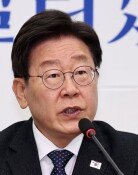Moon, Xi should find a peaceful solution to N. Korean nuclear issue
Moon, Xi should find a peaceful solution to N. Korean nuclear issue
Posted December. 12, 2017 08:19,
Updated December. 12, 2017 08:56
The South Korean presidential office of Cheong Wa Dae announced Sunday that Seoul and Beijing would not issue a joint statement or hold a joint press conference following President Moon’s bilateral summit with his Chinese counterpart Xi Jinping scheduled on Thursday in Beijing. Instead, the two nations will issue a joint press release after the summit, which would state the meeting’s result. During the former President Park Geun-hye’s administration, Seoul and Beijing adopted joint statements on both Park’s visit to China and Xi’s return visit to Seoul.
Unresolved differences in the two leaders’ stance on the U.S. Terminal High Altitude Area Defense missile system appear to explain why Seoul and Beijing have decided not to issue a joint statement after Moon’s summit with Xi on his first state visit to China. Since the THAAD agreement was announced by the two countries on October 31, Seoul has taken a consistent position that Korea and China agreed to narrow their differences on the issue. Meanwhile, China has put constant pressure on Korea to say “No” to an additional THAAD deployment, missile defense program and South Korea-U.S.-Japan military alliance. Chinese Foreign Minister Wang Yi expressed opposition on these three issues at the opening ceremony of the symposium on International Developments and China's Diplomacy on Saturday. Vice President Wei Wei of Chinese People's Institute of Foreign Affairs also said Sunday at a high-level think tank forum that a complete resolution of the THAAD issue will be a precondition to restore Korea-China ties.
Wang expressively opposed unilateral sanctions against Pyongyang other than United Nations Security Council resolutions. Diplomatic experts interpret his remarks as an attempt to give President Moon little chance of requesting China to halt supplying crude oil to North Korea prior to the summit with Xi. As a traditional diplomatic tactic, China expresses its firm posture or imposes pressure on a country that it is at odds before holding a bilateral summit. Nevertheless, it is not only a complete disregard for the other party of the summit, but also downright against diplomatic practices.
The South Korean government needs to show a firm and unwavering stance against China’s diplomatic nearsightedness that does not befit the status of a “great country.” Korean President Moon will have to persuade his Chinese counterpart that imposing strong anti-Pyongyang sanctions is imperative to prevent U.S. preemptive strikes on the North while emphasizing the two nations’ bilateral position to address the North Korean nuclear issue in a peaceful manner. In this regard, members of South Korean ruling Minjoo Party should forbear from causing any misunderstanding of the Chinese leadership by asserting that both South Korea and China agree on ending the North’s nuclear provocations and South Korea-U.S. joint military drills; and proceeding with the denuclearization process and signing a North Korea-U.S. peace treaty simultaneously. President Moon should harness his diplomatic skills to find a common ground with Xi to peacefully address issues based on the solid South Korea-U.S. alliance — the highest form of pressure on the North Korean nuclear issue.







